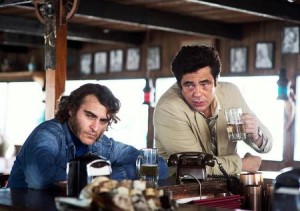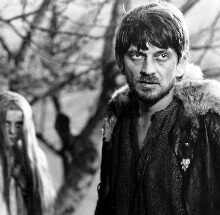 You’ve heard of a shaggy dog story. Inherent Vice, the marvelous new film by Paul Thomas Anderson, is a shaggy hippie story. Joaquin Phoenix plays a stoner private detective named Doc Sportello, with wild unkempt hair and muttonchop whiskers, living in a southern California beach town in 1970. He is visited by an ex-girlfriend named Shasta Fay Hepworth (the names in this film are wonderful), who tells him she’s been having an affair with a real estate magnate named Wolfmann—a gentleman, as Doc says, of the straight world persuasion. It seems that Wolfmann’s wife and her lover have plans to put him away in a looney bin to gain control of his money. From this modest beginning, Doc’s pursuit of the various angles to the plot branch out into a shadowy realm that includes a Vietnamese drug cartel, right-wing political operatives, and a group of crooked developers concealed by a tax shelter for dentists. The best private eye stories are thrillingly complex—and I’m sure this one makes sense, although you’d probably need to wait for the DVD and then stop the film every few scenes to take notes if you ever hope to tie all the ends together in your mind. Needless to say, that’s not the point. Part of the joy of this scenario, adapted by Anderson from a Thomas Pynchon novel, is how the bewildering maze of the plot matches the perpetually spaced-out and off-kilter experience of the counterculture era. This is well embodied by Joaquin Phoenix, who fills the role of Doc with a sense of earnestness and concentration—it’s not an overtly comic turn, but a character study, albeit one of the weirdest and most inarticulate characters that have ever been at the center of a film. His sentences trail off before finishing; his look of alarm sometimes interrupted by an uncontrollable giggle. You can’t imagine him actually solving a case, but somehow he holds his own.
You’ve heard of a shaggy dog story. Inherent Vice, the marvelous new film by Paul Thomas Anderson, is a shaggy hippie story. Joaquin Phoenix plays a stoner private detective named Doc Sportello, with wild unkempt hair and muttonchop whiskers, living in a southern California beach town in 1970. He is visited by an ex-girlfriend named Shasta Fay Hepworth (the names in this film are wonderful), who tells him she’s been having an affair with a real estate magnate named Wolfmann—a gentleman, as Doc says, of the straight world persuasion. It seems that Wolfmann’s wife and her lover have plans to put him away in a looney bin to gain control of his money. From this modest beginning, Doc’s pursuit of the various angles to the plot branch out into a shadowy realm that includes a Vietnamese drug cartel, right-wing political operatives, and a group of crooked developers concealed by a tax shelter for dentists. The best private eye stories are thrillingly complex—and I’m sure this one makes sense, although you’d probably need to wait for the DVD and then stop the film every few scenes to take notes if you ever hope to tie all the ends together in your mind. Needless to say, that’s not the point. Part of the joy of this scenario, adapted by Anderson from a Thomas Pynchon novel, is how the bewildering maze of the plot matches the perpetually spaced-out and off-kilter experience of the counterculture era. This is well embodied by Joaquin Phoenix, who fills the role of Doc with a sense of earnestness and concentration—it’s not an overtly comic turn, but a character study, albeit one of the weirdest and most inarticulate characters that have ever been at the center of a film. His sentences trail off before finishing; his look of alarm sometimes interrupted by an uncontrollable giggle. You can’t imagine him actually solving a case, but somehow he holds his own.
Rather than have the picture narrated by Doc, which would be the traditional film noir method, Anderson has chosen to give that job to a minor character, best friend and flower child astrologer Sortilege, or Lege for short, played by the singer/songwriter Joanna Newsom, her airy spiritual lingo expressing a certain real world wisdom. Besides Phoenix, who is sort of the black hole towards which all the other actors tend to drift, the movie’s anchor is the delicate performance of Katherine Waterston as Shasta Lee. Her extended monologue towards the end, difficult to do even it weren’t performed naked, sums up something precious but also broken about sex, drugs, and rock-n-roll as a substitute for conscious life.
The film features quite a few interesting star turns, including Reese Witherspoon as a snooty assistant D.A. who doesn’t mind fooling around with Doc when no one’s looking; Benicio del Toro as Doc’s mysterious lawyer Sauncho Smilax (extra points for the Don Quixote reference); and Owen Wilson as a junkie surf guitarist gone underground after faking his own death. Almost stealing the picture is Josh Brolin as a mean squareheaded cop nicknamed Bigfoot, who hates hippies and maybe secretly wants to be one. He’s hilarious throughout, for example in a scene where he angrily barks orders at the waiter in a Japanese restaurant—in Japanese. This is typical of the film in that it not only seems funny, but sad and painful at the same time. Inherent Vice is all about pain and grief and loneliness—Pynchon, and Anderson, know that this is a true source of humor. The similarities to the Coen brothers’ The Big Lebowski are only apparent. Here there is a real feeling for what was lost during the slow death of the Sixties and Seventies. This look back at a crossroads of our time is not one of mockery, but of deep affection.
The time I have on this show is too short to really describe how weird and messy and interesting and funny and heartbreaking Inherent Vice is. Do I love this movie? Uh, yeah man. Yeah, I do.






